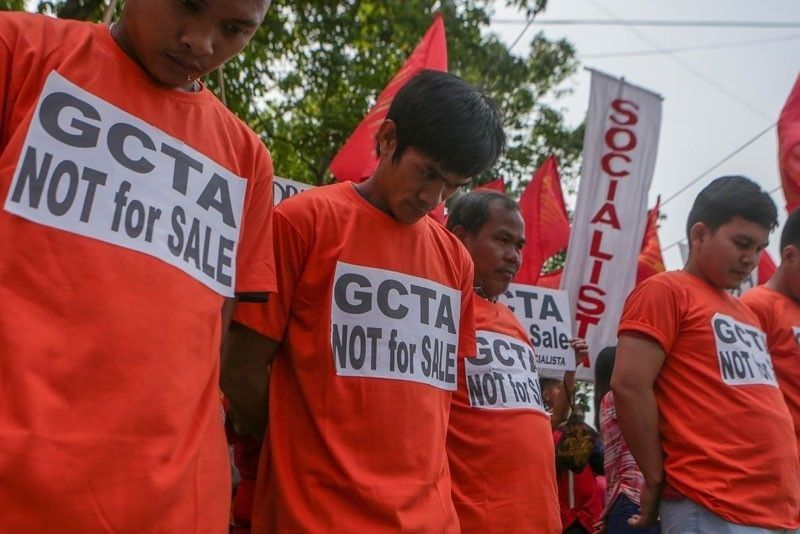After suspension and call for transparency, government quietly resumes GCTA

MANILA, Philippines — The Department of Justice said Monday that processing of applications for release under the Good Conduct and Time Allowance law continues despite an announced suspension in August 2019.
“The processing of GCTA for convicts continues” but some applications are held "in abeyance," Justice Undersecretary Mark Perete told reporters on Monday.
The DOJ did not release data on how many applications were processed and how many convicts have been released since the resumption of GCTA processing. Perete said the DOJ is "having our coordinating meeting with [Bureau of Corrections] to validate the data."
"We will disclose them once validated,” he added.
In late August 2019, Justice Secretary Menardo Guevarra ordered the suspension of GCTA for inmates in light of a controversy on whether murder and rape convict Antonio Sanchez was eligible for time allowances. The controversy led to Senate hearings on the GCTA, which rewards convicts for good behavior by crediting them with time served.
The DOJ, in September 2019, issued revised Implementing Rules and Regulation on Republic Act 10592 or the GCTA law, excluding convicts of heinous crimes from availing of the law’s benefits.
A year since the revision of the rules’ guidelines, questions still hound the law and the DOJ.
Perete: Applications held in abeyance
Perete explained that there are GCTA applications that were held in abeyance until the issuance of the Uniform Manual on Time Allowances, following the revised IRR of Republic Act 10952.
“There are cases affected by the new IRR (eg those charged with heinous crimes but eventually convicted of non-heinous crimes),” Perete said.
Under the revised IRR, issued September 2019, Persons Deprived of Liberty charged of heinous crimes — such as murder — are not entitled to GCTA during preventive imprisonment, or the time of detention awaiting final judgment.
RELATED: Excluded from GCTA or not? Why Sanchez's release was 'a possibility'
In April 2020, Perete said that the manual is near completion and is for “finalization.”
US Marine Joseph Scott Pemberton's case is among those held in abeyance.
The US marine was charged with murder, a heinous crime under the revised IRR of the GCTA, for the killing of Filipino transgender woman Jennifer Laude in 2014. The court later convicted him of homicide—an offense not classified as a heinous crime.
“As to [PDLs charged with heinous crimes, but convicted with non-heinous offense], presumptive GCTA is computed but the award is held in abeyance until the issuance of the Manual.”
The Bureau of Corrections cited the provision on heinous crimes in opposing Pemberton's early release.
Pemberton's case
Pemberton in June asked the Olongapo Regional Trial Court Branch 74 to order the Bureau of Corrections to compute his time served, applying the provisions of the GCTA. According to the court’s September 1 order, the bureau submitted its compliance on July 29, and four days later, the US marine’s legal team moved for his release.
Pemberton’s lawyer argued that the BuCor’s computation is “incorrect,” due to several periods of time served and GCTA supposedly not included in the computation.
BuCor, in its Comment, told the court: “The presumptive entitlement of GCTA issued by the Inmates’ Documents Processing Division was computed only up to May 2020 or when the BuCor submitted its Compliance dated 26 June 2020.”
“At this point in time, BuCor can only provide and/or issue presumptive entitlement of GCTA, or until after the Unified Manual for the grant of GCTA is signed and approved by the Secretary of Justice and the Secretary of the Interior and Local Government,” it added.
BuCor stressed that the issuance of GCTA on Pemberton’s case “will remain to be presumptive entitlement in character.”
The Olongapo Regional Trial Court Branch 74 ordered Pemberton's release after it accounted time allowances that he earned while serving in prison, but the DOJ said it intends to block the US marine’s release by filing a motion of reconsideration this week.
Pemberton lawyer: Unreleased manual cannot stop implementation of law
Lawyer Rowena Flores, Pemberton’s counsel, argued that the absence of the uniform manual cannot halt the GCTA release.
“The application of the law cannot be stopped by non-issuance of manual or even IRR,” she told Philstar.com in a message. This was held in the October 2008 case of SEC vs. Interport, she said.
In the said case, the SC held: “In the absence of any constitutional or statutory infirmity... this Court upholds these provisions as legal and binding. It is well settled that every law has in its favor the presumption of validity. Unless and until a specific provision of the law is declared invalid and unconstitutional, the same is valid and binding for all intents and purposes.”
It added: “The mere absence of implementing rules cannot effectively invalidate provisions of law, where a reasonable construction that will support the law may be given.”
In a statement on the Anti-Terrorism Law in July, the Office of the Solicitor General stressed that the controversial law is already in force even if the DOJ is still working on its Implementing Rules and Regulations.
"A law is presumed to be valid when there exists an interpretation favorable to its effectivity," Solicitor General Jose Calida said then.
- Latest
- Trending






























